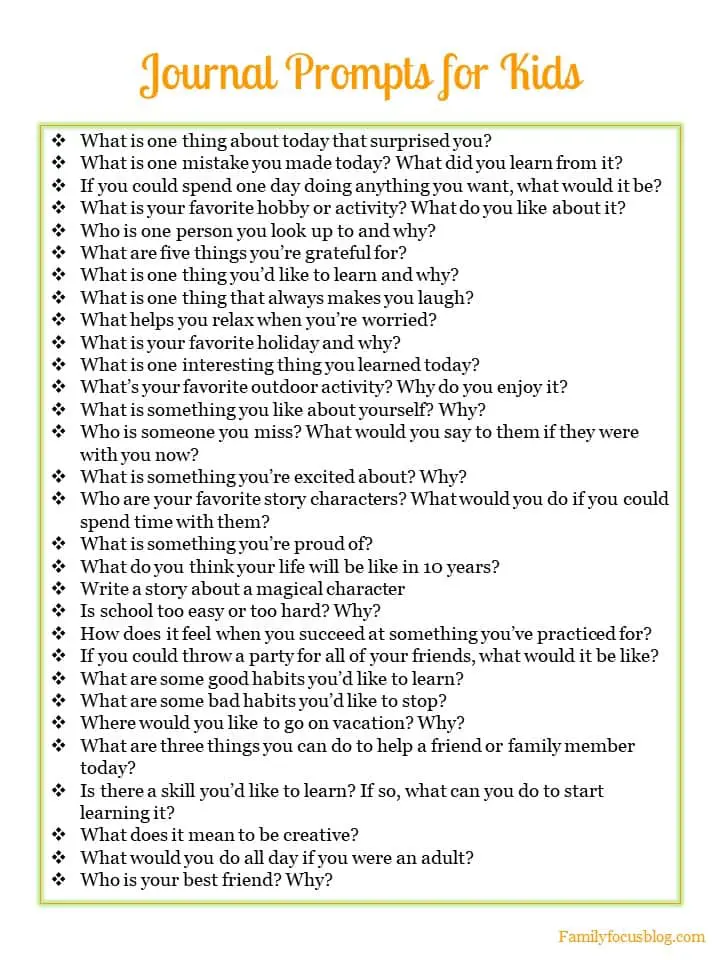Growing up, I was a journal junkie. I wrote of my troubles, wonders, heartaches, dreams, gossip, secrets, and daily happenings. For a few minutes each day, I would just write. Whether it was a few lines or few pages, each entry helped me get something off of my chest and kept me from bottling up my emotions. The benefits of journaling for mental health are huge. But most importantly, I loved it and it was fun! Below I’ve provided a few reasons why I think kids should write in a daily journal. I also discuss various types of journals and provide a printable list of journal prompts of kids to get started. There are so many benefits of keeping a journal, both on a personal level and as a student.

Benefits of Journal Writing (or Reasons To Keep A Journal)
The benefits of journaling apply to children, students, and adults alike. Expressive writing is a great habit to develop as a child. This will leave you naturally inclined to turn to regular journaling as an adult for a coping mechanism when your problems may feel larger and more overwhelming. These 5 benefits of journal writing for students were provided by Meredith Rodefer.
1. To Preserve Memories
Keeping a journal is a great way to preserve memories. It’s fun to go back and read through some of my old personal journals and experience who I’ve been. The detail within each story is astonishing. Old photos might show memories, but journal entries TELL them. That’s valuable! That is a good reason to journal. The gift of story telling can help us not only remember details more clearly but also to make sense of our lives.
2. It’s Technology-free
Social media has paved the way for kids to express their thoughts on the internet. And while I believe that the growth of the blogging sphere is positive, it’s not private. A journal IS private, and it ensures that kids are focusing on themselves and not on the commentary or approval of others. Plus, it can be relaxing to turn off the technology for half an hour!
3. Can Reduce Stress And Provide An Emotional Release
Stress often stems from uncertainty. Organizing his/her thoughts on paper can aid in problem solving. Taking a minute to write it out on paper can make stressful events become more manageable as the situation becomes clearer. Journals or diaries, as opposed to other forms of writing, are outlets for expressing the difficult emotions, like anger or frustration, without hurting loved ones. The benefits of journaling for stress management will help your child more and more as they go through their often difficult teen years and into adulthood.
These stress relief journaling benefits hold true even at a higher level for mental health. Some psychotherapists are now recommending journaling as a method to help cope with traumatic events. Additionally, there are even health benefits for the immune system that are associated with the reduction in stress. As Intermountain Healthcare says, “expressive writing can strengthen your immunity and decrease your risk of illness.”
Just to be clear, journaling is not a replacement for speaking to a mental health provider. Please seek professional medical advice for any concerns you may have.
4. To Develop Positivism
Have your child literally write down positive thoughts and throw away negative ones! Physically throwing away negative thoughts can help clear your child’s mind. And writing down positive thoughts can help a child appreciate him/herself and what he/she has. Personally, writing down things I loved about myself in my journal as a child made me feel more confident, and consequently, happier! Being reminded of positive things on a regular basis was an effective tool to see things in a new light. It also helped me to focus on and remember positive experiences in more detail.
5. To Gain Perspective
Sometimes, writing troubling situations down can help kids to discover a new perspective. Writing forces children to retell the story to themselves. Most of the time, details of past experiences that were in the background before will rise to the surface. Maybe they’ll find new lessons. Writing in journals can help remind your children that they are the authors of their own lives. Only they can define their stories.
A journal can almost become like a best friend that you can tell all your problems to without then having to deal with a real person knowing your inner thoughts. This can be useful as a way of working through your feelings and gaining perspective before you take action. Working on looking a situation from various people’s perspectives is helpful in raising our overall emotional intelligence.
Remember, it’s never too early or late to start a journal!
Here is a funny journal entry from my son’s journal when he was 5.
Benefits Of Keeping A Journal For Students
A kids journal is a great place to start to develop a great life long habit. It is a great coping mechanism and it is great for furthering writing skills. You can’t go wrong.
In Kindergarten, my son complained that he was bored every day. His teacher decided he should start keeping a journal to make his day more fun when he had spare time. Though she had prescribed this journaling activity for her student at school to fill his spare time, he took this concept home with him. He began journaling if he got bored at home too. At 5 years of age, you can see that his journal entries were pretty much a sentence with a drawing. I believe he enjoyed communicating with me this way and he could tell I got a kick out of reading his journal which I believe contributed to his self confidence growing.
Over time he progressed to poems and comics and lists as journal activities and they are entirely self-motivated and at his own convenience. Journaling provides him with an outlet for his creativity and helps him develop into a better writer and communicator. The benefits of journaling for kids includes giving them the opportunity to express themselves and explore their feelings and thoughts in a deeper way.
I can also attest to the fact that journaling is great for college students too. The journaling habit was very useful to me in processing negative feelings while I was in college. It helped provide me with an outlet for expression that would then allow me to feel more closure and move past a difficult time.
How To To Choose The Right Type Of Journal For Kids
While it is possible to journal on any piece of paper, it is always nice to have a notebook dedicated to the task. There are actually a wide variety of journals for kids ranging from blank pages to lined pages to graph paper pages. It is important to let the child chose the method of journal that works best for them. Kids should feel free to mix it up and try out several options before settling on one.

An Art Journal
Some kids are not into writing and expressing their emotions is hard work. These children may benefit most from an art journal. I used to pick song lyrics or quotes and write them in my journal then do artwork around them. I liked that I knew what emotion I was working through when I selected the quote and why but others wouldn’t be able to know exactly what I was feeling. As I drew and colored around the words, it was like therapy for me to think about it and release it.
A Spiritual Journal
Some kids may enjoy writing down a scripture or bible verse and talking about it means to them. This is a great way to reap the spiritual benefits of journaling.
A Daily Journal
A daily journal for kids may be the most traditional type of journal. Your child can simply write about what happened to them each day. A writing journal is a great way for them to begin to record their daily life and as they do so, they will naturally learn to explore their thoughts and feelings as time passes and they grow more comfortable with writing.
Gratitude Journal For Kids
A gratitude journal is a wonderful way for kids to work on their positivity. Having the opportunity to express what we are grateful for allows us for build a framework to process our lives. Often times, family therapists will suggest that children of divorce or children suffering with depression or anger, try gratitude journaling to help learn to view things from a more positive perspective.
Nature Journal
Maybe you have a little scientist on your hands who is not as into writing but is interested in learning about science. You can interest them in journaling with a nature journal where they can record the things they find on their daily walks and write down facts about flora and fauna.

A Bullet Journal
This is a new fangled idea! Bullet journals are a newer concept and they tend to incorporate to do list, goals, and charts that track anything from exercise to feelings. My daughter started bullet journaling when she was a tween and has stayed with this style into her teens. Many adults also enjoy a bullet journal.

Journal Prompts For Kids
Some children may prefer journal prompts. They can be centered around their interests or their activities. I have included a printable of journal prompts for kids in image form above or here in pdf. Here are a few extra examples of journal prompts:
- List of your favorite school activities and share why you enjoy them.
- What is your first memory?
- Who are your best friends? What qualities do you enjoy most about each friend?
- What are you feeling most grateful for today?
- Write about your ideal way to spend a day off.
- What are some of your favorite things to do?
- What is your favorite family memory?
- If you could go anywhere, where would you go? Why?
- What are some of your favorite quotes?
- What did you do today?
- Write about someone you have met fairly recently that has been influential to you.
- Write about someone you have known a long time that has been influential to you.
- What do you enjoy doing a daily basis?
- What is something you would like to try doing?
- Where have you most enjoyed visiting?
- Where would you like to visit if you were given a free airplane ticket?
- How do enjoy spending your down time?
- How do you accomplish big goals?
- Who inspires you and in what way?
- Who are your role models?
- Write about a challenge you have overcome.
- Write about a new skill you have learned.
- What are some of you long standing interests?
- What are some things that have newly begun to interest you?
- Where is your favorite place to spend time outside of the home?
- Where is your favorite place to spend time in your house?
- Do you enjoy cooking?
- What are your favorite dishes to cook or eat?
- Do you play an instrument and what do you enjoy about it?
- If not, which one would you like to learn?
- Who makes you laugh often?
- Who do you go to for support?
Journal prompts may be the best way to establish a journaling practice because having one question a day helps develop the habit. The act of writing itself is one of the most effective ways to get those creative juices flowing. Once you are enjoying it, a journaling routine will become easy!
Conclusion
I hope you enjoyed learning about the different types of journals for kids. Let your child chose the one that appeals to them the most. Journal writing for kids is such a great habit to develop early and they will benefit in so many different ways. Journaling for tweens and teens and even adults still offers all the same benefits of developing writing and communication skills as well as organizing thoughts, improving coping responses, and allowing for the flow of creativity. You may want to try making your own journal too!
Do you or your kids keep a journal? Have we missed any journaling benefits? Tell us what you or your child enjoy most about journal writing @familyfocusblog on social media!
Related Posts:
Journal Ideas: How to Fill the Pages
Importance Of Writing Skills For Your Child
35 Awesome Kindergarten Math Journal Prompts
Make A Digital Journal Online To Preserve Your Family Memories



Laura says
I love this. Keeping a journal also helps kids develop their communication skills. These are some great journal prompts to help kids get started with journaling!
Alana says
I’ve kept a journal since I was very young. I think it helps us to realise how we have grown and matured, as sometimes I think because it happens over time we don’t realise it and don’t give ourselves enough credit. You’re also right that it helps us to gain perspective, occasionally I will read back on entries and see that things that I was so worked up about don’t even matter to me anymore, and that little things like that in the future shouldn’t matter so much either.
Sujatha Lalgudi says
Nice article. I used to write in my dairy every day as a teenager. My mother preserved them and now, many many years later, I went through them and yes, it cracked me up to read them now 🙂
We bought a ‘secret’ dairy for my daughter and she writes in it regularly.
Thanks again!
Sujatha Lalgudi
Michael says
Thanks for sharing the biggest benefits of journal writing for students. I think the act of journaling is great to get the creative juices flowing. Whether you are dealing with negative emotions from traumatic experiences or just writing about good news or setting goals, there are so many good reasons to keep a journal.